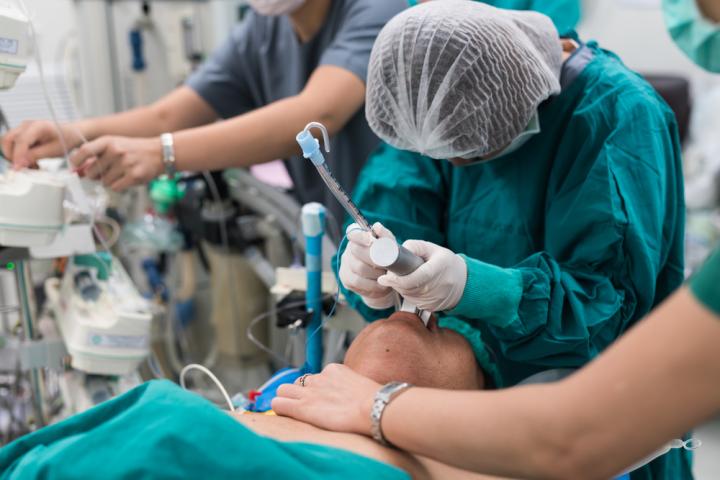Study reveals life-threatening complications for patients requiring respiratory life support

Credit: Shutterstock
Some 40% of critically ill patients who undergo tracheal intubation to support their breathing suffer a life-threatening complication, research from National University of Ireland Galway has revealed.
The study, published today in JAMA: The Journal of the American Medical Association, involved 2,964 critically ill men and women. It was carried out across 29 countries from 1 October 2018 to 31 July 2019 to determine the risk of adverse events arising from the invasive procedure.
John Laffey, Professor of Intensive Care Medicine at NUI Galway and Consultant in Anaesthesia and Intensive Care Medicine at University Hospital Galway, was co-author of the study.
“Placing a critically-ill patient on a ventilator is one of the most common forms of life support we can offer someone in intensive care,” Professor Laffey said.
“But in order to provide this treatment clinicians have to perform tracheal intubation – an invasive procedure where a tube is inserted via the mouth into the windpipe.
“A better knowledge and understanding of the complications associated with this procedure is of particular importance as we respond to the impact of Covid-19. The pandemic is forcing us medics to do far more of these procedures than usual and understanding the associated complications is the first step to finding ways to avoid them in future, and hopefully reduce the risk to our patients.”
Findings from the INTUBE research study have been presented by Professor Laffey at the Society of Critical Care Conference.
Key findings included:
- 45.2% of patients experienced at least one life-threatening complication followed intubation.
- Some 42.6% of patients suffered severe cardiovascular instability.
- 272 patients, 9.3% of those in the study, suffered severe hypoxemia or very low oxygen levels.
- 93 patients, 3.1% of those in the study, suffered cardiac arrest.
- Patients who were at highest risk of life-threatening complications had hemodynamic instability prior to intubation.
- Successful tracheal intubation on the first attempt at the procedure was associated with a lower risk of complications compared to repeated intubation attempts.
Professor Laffey added: “As clinicians we have relatively limited information on complications associated with tracheal intubation, how they affect our patients and how we can minimise the risk.
“Our research shows a surprisingly high incidence of life-threatening complications associated with the procedure – with almost half of patients affected in this way. More importantly it shows that some of these complications might be potentially preventable with different approaches and that we can improve outcomes for patients undergoing these high-risk procedures.
“A particular concern is that our research showed that patients who suffered an adverse event related to intubation were more likely to die either in the intensive care unit or within 28 days of the adverse event.”
Professor Tim O’Brien, Dean of the College of Medicine, Nursing and Health Sciences at NUI Galway, and Consultant Physician with Saolta University Healthcare Group, said: “Clinical research in intensive care units is challenging but it is critically important to guide clinical practice and is essential to improve survival rates. Studies like this have a major impact on clinical practice and of course the relevance of this study is accentuated as a result of Covid.”
Kevin Clarkson, Clinical Director of Critical and Perioperative Care at the Saolta Hospital Group/University Hospital Galway, said: “This international observational study, in which NUI Galway and Saolta Hospital Group investigators played a lead role, emphasises the ongoing need to invest in postgraduate training, equipping and simulation in this hazardous environment.
“The study sheds light in areas of practice that need improvement and will likely lead to better patient outcomes. Specifically, instruments to facilitate tracheal intubation and use of equipment to detect carbon dioxide in a correctly placed breathing tube are clear opportunities to reduce risk. Training opportunities at local University Hospital level, regional groups and national training body programmes are vital along with participation in research such as this to highlight the needs of critically ill patients from the outset of their acute illness.”
###
Notes for Editors
A copy of the paper on the INTUBE study – INternational observational study To Understand the impact and BEst practices of airway management in critically-ill patients – is available on request. Link to the paper on the Journal of American Medical Association: https:/
Media Contact
Ed Carty
[email protected]
Related Journal Article
http://dx.




